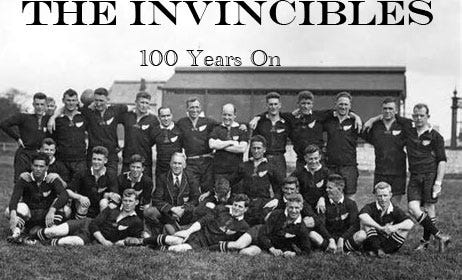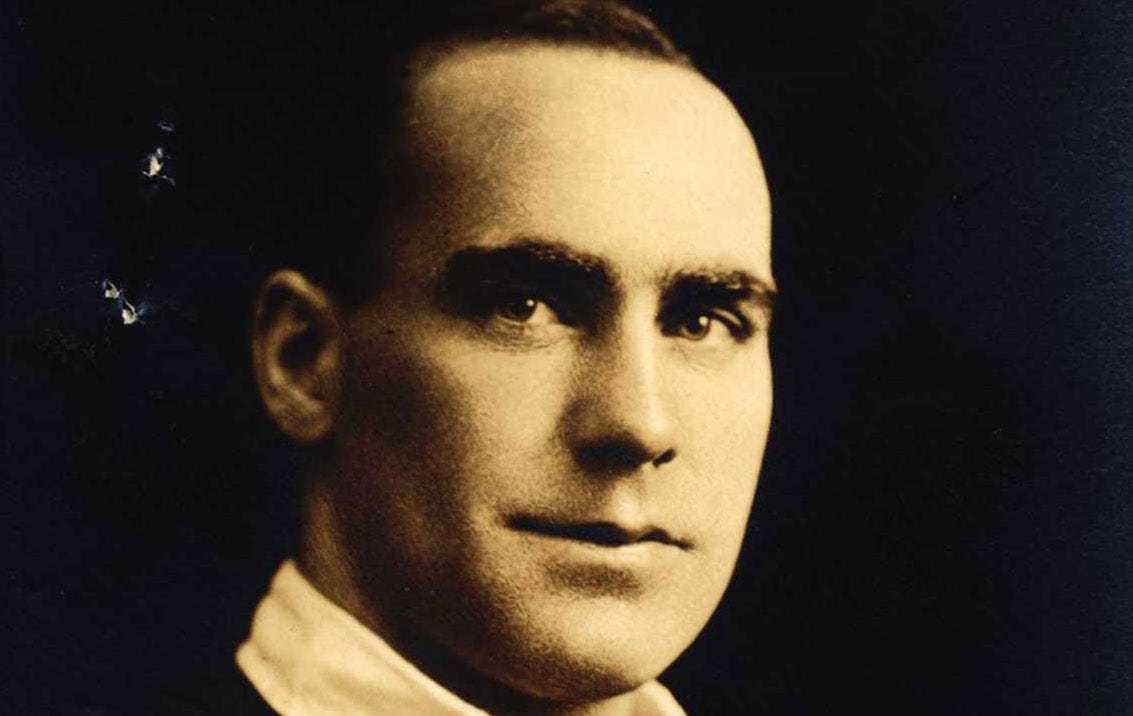Since the All Blacks first toured in 1893, it is doubtful any captain carried the off-field load borne by Cliff Porter, the leader of the side that became known as 'The Invincibles' on their 1924-25 tour of Britain, Ireland, France and Canada.
One of the questions asked most often about the tour was why Porter was overlooked for the Test matches against Ireland, Wales and England.
He missed the first Test, against Ireland, because he was unfit, having suffered a kick to his knee against Lancashire two games before the Test. He also played against Cumberland in the pre-Test game but was below full strength, while fellow 'rover' Jim Parker was in such good touch he played on the wing against Cumberland. But, there was also concern that Porter was leaving himself vulnerable to penalties.
Parker took his chances. He had played only four games at rover and a fifth as wing three-quarter before the Test compared to nine games by Porter.
George Nepia said the issue of Porter's non-selection for the Tests was simple.
Porter could not persuade himself that the British referees were right in commanding that the wing forward should immediately retire to the rear of the scrum after putting the ball into it. He used to stay in the station the rovers, as a matter of course, adopted in New Zealand. Jim, on the other hand, worked on the theory that in Rome one does as the Romans do. He used to retire and not incur penalties and Cliff used to stay and be penalised. That, in a nutshell, is the story of the two men – but let it not be thought that Porter was a negligible factor on the tour. In fact, his was the principal voice, in all things. He is the greatest captain I ever played under.[1]
Cliff Porter - Archives New Zealand Reference: ACGO 8333 IA1 1349 15/11/17721
But Porter had another issue - the work he had to do off the field because manager Stan Dean failed in many of the requirements of his job. While sailing to Britain, the pair agreed that Porter would look after things on the field and Dean would do the off-field work. However, it didn't work out. Nepia related that as early as their first training run in England, at Newton Abbot in Devon, Porter needed to remind Dean of their agreement. Porter said whenever there were three blasts on his whistle, all players were to stop what they were doing and gather around him. At the first blast of the whistle, Dean joined the group. Porter said to him,
Now, Mr Dean, I want you to understand that the policy we agreed to on the ship will be strictly adhered to. Your place is not out there, on the field, it is here, on the sideline.' Without protest, Dean walked from the field and never again tried to raise his voice.[2]
But as the tour progressed, Porter became so overloaded with off-field duties he called a meeting of the team's management committee, [which included vice-captain Jock Richardson, Maurice Brownlie and Mark Nicholls] without Dean attending. Interviewed many years later, Porter said,
I offered to resign, Dean would get up out of his grave if he knew.
I called the meeting about our manager because I wanted to tell them that we hadn't any management and things got a bit out of hand. I said, 'I'm not going to carry on. I can't get what I'm asking for, and we'll have to get someone better than me.'
I told them, 'I haven't invited Dean because it didn't seem the right thing to do, but I want to have a talk to you because I know what Dean would say if he was here.' I've called us together to ask your opinion, do you want me as your captain?
I want a better understanding between the management and myself. I've got no say, and you can't have two managers and you can't have two captains.
I think I'll step down. I'll tell the manager after we've had this talk.
They told me not to. They said 100 per cent under the circumstances they understand. I had the team's support, so I had the authority.[3]
The issues he faced, especially considering it was traditional at the time that the captain was also the coach of the side or at least had a significant say in the side's tactical choices. But Jock Richardson offered the claim that Porter put on two stones on the voyage to Britain and struggled to get the weight off. After the tour, he also claimed in a welcome home gathering in Invercargill that the style of play in Britain did not suit Porter. He told the meeting he would never forget Porter's words, saying, 'If you think I am not fit, put the other man in.' Richardson thought he had played a man's part and would never forget that.
However, much of Porter's complaints were due to the lack of liaison and preparation with local officials. At some game grounds, they found no hot water for showers. Porter had to go to the grounds beforehand to check those details because Dean never did it, although it was part of his job.
I made sure there were towels there, and if there weren't I would ring up. You would go to some places and there were no towels supplied. But nobody told us. It was little things. They are things for management, not for a captain to be running around doing. But I found out.
Dean was a great man socially with The Rugby Union, but by Jove, he didn't offer the players much.[4]
Porter took over the manager's expenses for bandages and masseurs. Players would go off to town to see specialists and run up bills of 30-40 pounds, and the Rugby Union [England] paid it without a whimper; they saw it as expenses, he said.
The All Blacks put up with it until Porter spoke to England captain Wavell Wakefield early in the tour.
He said, 'How are you getting on?' And I said 'Bloody awful, we can't get a masseur.' He said, 'What? You've got to have a masseur.'[5]
When The Rugby Union said that would make them professionals, Wakefield said the All Blacks should ask for a personal servant. Porter said they were unaware that privilege was available to the side and asked why they had not been told. Wakefield said he didn't know why, but they should request one.
So we asked for a personal servant and they would pay him so much a week, so we got a masseur - one who had served in the Navy.
The masseur was the hardest worked man in the team. The players playing the next game were first to get a massage. There were so many arguments. We trained each day from 10-12. Had lunch and then got a massage. We had to cut it back to 30 minutes per player. You've got to have attention right away, not a couple of days afterwards.[6]
At one stage, Porter and Abe Munro went to a specialist in Harley Street, Trimble Fisher, to get a cartilage put back in and were charged 200 pounds, but the Rugby Union refused to pay. There was a dispute, and Fisher said he wouldn't treat other players.
Ian Harvey was a player who was crook on the tour, he went to Australia and he was crook, and he went to Africa and was crook. He never played any football but they kept picking him. We all knew he was liable to go out anytime. He should never have passed a medical. Ron Stewart was one who worried me because they said to me this man won't live long, the doctor told me. He said, you go through these cities travelling around with the team, he's not fit, he's not well, he's got TB. I advise you he should go across to Canada for a holiday for six weeks as it would do him the world of good because he'll be no good travelling around here, he won't get any better.' He's still alive isn't he? Ron was 17 stone. He played but he wasn't the Ron Stewart in New Zealand when he played. He got no worse. He was a good footballer, a big man and a nice chap too.[7]
Early in his journalism career, rugby writer TP McLean worked in New Plymouth and met Porter in the street. They chatted, and the reason for Porter's situation on the 1924-25 tour came up. McLean later claimed Porter told him that an injury kept him from the Ireland game but said the Welsh and English Tests differed. He felt his form had recovered and his leadership and backline harassment abilities were restored, but the votes of Dean and vice-captain Jock Richardson in selection meetings kept him from making the sides. Having been hurt by those decisions and frustrated at the leadership of the New Zealand Rugby Union on several matters under Dean's leadership, he related to McLean that,
I am finished with Rugby, that is, until the present New Zealand administation is altered. For old internationals like Jim Moffitt, Karl Ifwersen, Mark Nicholls and myself there appears no scope, and we feel dissatisfied. The annual meeting of the New Zealand union is a farce and I will not attend any more. The president is a figurehead and resolutions passed at the annual meeting are apt to have no notice taken of them by the management committee.[8]
The opposition evening paper in New Plymouth sought clarification from Porter that the comments in McLean's story were correct. Porter did not deny he had made them.
Bert Cooke backed Porter's claims in relation to Dean and said the team witnessed Porter tell Dean that so long as he was involved in the NZRU he intended to keep out of it.[9] And so did Arthur Carman. He said Porter, without any question was 'the nuts-and-bolts man of the tour.'[10]
NEXT EPISODE: Ulster feel the All Blacks' developing strength
[1] George Nepia, I, George Nepia, London League Publications edition, London, 2002
[2] ibid
[3] Cliff Porter, interviewed by Ian Stevenson, 1975-76. Stevenson was a Canadian rugby fan who visited New Zealand and interviewed several members of the Invincibles. The tapes are of poor quality, although Porter's is probably the easiest interview to listen to.
[4] Porter ibid
[5] ibid
[6] ibid
[7] ibid
[8] The Daily News, New Plymouth, 23 January 1936
[9] Bert Cooke, Bert Cooke, 'My Football Memories,' The New Zealand Observer.
[10] Arthur Carman, quoted by T.P. McLean, New Zealand Rugby Legends, MOA Publications, Auckland, 1987




